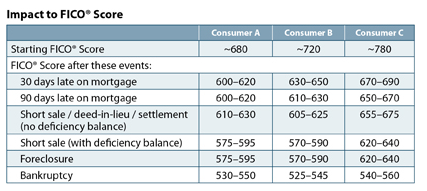
This week I spoke to two clients, both of whom had six-figure salaries, about whether a short sale would be best for them.
High earner Case 1: Client was in the middle of a short sale (and was calling for a second opinion). He owned three properties and the one being short-sold was $100k underwater. It used to be his primary residence, but he rented it out for two years before starting the short sale. There were two mortgages. The first mortgage company wanted him to sign a promissory note for $8000 payable over 10 years. The second mortgage company wanted $10,000 cash contribution from him to allow the short sale. The client had $70k in credit card debt. The client wanted to know if he should complete the short sale or bail out and let the foreclosure be completed.
I would not have recommended a short sale in this case, because the client will have 1099 income after the short sale since this was not his primary residence. Also the second mortgage was refusing to release him from liability even though he had to pay them. He would have been much better off filing a chapter 13 bankruptcy which would vaporize the 1099, control the credit card debt with no interest and allow him to ditch all liability on the second mortgage.
High earner Case 2: Client bought a condo for his Mom (I can’t believe the number of people who bought properties for family members between 2004 and 2008-there are tons of them) Client earns $150k per year. Client paid $120k for the condo and put down 20%. The condo is now worth $40,000! So the down payment is gone and the condo complex is riddled with foreclosures and short sales. In fact, the complex is close to being a zombie complex in which FHA or conventional financing can’t be obtained because of the lack of reserves and high delinquency rate. The condo dues were almost $400/mo. Since it was not his primary residence, there will be 1099 income after a short sale or foreclosure.
I like short sales where there is only one mortgage, but the client was reluctant to try it for two reasons: There will be 1099 income after a short sale and, due to his high income, the short sale lender would ask for a high contribution from him to allow the short sale to close. The client pretty much concluded it would be better to strategically default on the unit, skip the short sale and take the hit to his credit and pay the 1099 income at the end of the foreclosure.
Here are some of the problems with short sales and high earners:
1. No hardship. The owner is supposed to show a hardship. Sorry, but it’s going to be hard to come up with credible hardship letter when you make $150k annually. Luckily, most lenders are pretty flexible about what entails a hardship and it’s more likely that the lender will try to extract cash from you than deny your short sale for lack of hardship.
2. Have to furnish bank statements/ tax returns. High earners are very wary about furnishing bank statements and tax returns to the short sale lender. They are afraid that the lender will use this info to try to collect from them later. I have not found that to be the case, but this is a pretty pervasive fear among the high earner/short sale set. Most will not even consider a short sale when they hear that they have to hand over tax returns and bank statements.
3. Negotiator is a debt collector (not your friend). The lender appoints a “negotiator” to work on your short sale. This person is a glorified debt collector and once he or she sees your Vail ski condo or $75k in your bank account, they will ask you to contribute to the short sale. This is either in the form of a promissory note over 5 or 10 years or a cash payment. Both first and second mortgages may ask for contributions. I think contributions are fine as long as the lender releases the debt and forgives any deficiency. If the lender does not release any deficiency, what is the point of making a contribution? The contribution needed for release on a second mortgage will often be very high, making the whole short sale illogical at best.
4. Even if you keep current, credit will decline. Some high earners try to keep current on the mortgage payments during a short sale hoping their credit will not suffer. Unfortunately, I have found that the credit score will still decline by 150-200 points after a short sale even if the payments are kept current.
5. Second mortgages are a pox. Any property with a second mortgage will continue to be a lingering problem after a short sale. It’s likely the second mortgage lender will file a collection action, get a judgment and garnish your wages after the short sale. So what exactly was the point of the short sale?
When to try it:
I think a short sale of a primary residence is worth pursuing for a high earner who has only a first mortgage (no second mortgage) where the owner can get a release of liability. Even if the owner cannot get a release of liability it may still make sense, since most first mortgage holders don’t pursue the owner after a short sale closing.
When to pass:
Reluctant disclosers. Clients who are wary of disclosing tax returns and pay information to the lender should not consider a short sale.
Second mortgages. There is rarely a reason to short sell a property with a second mortgage because it’s likely the second lender will pursue you after closing and your credit will decline as much as a foreclosure. Or they will ask for a large contribution, making the whole thing uneconomical.
Investment properties. For investment properties, the 1099 income after a short sale will be brutal. Also, the lender may pursue you for a deficiency, so it’s often better to consider filing a chapter 13 bankruptcy to erase the 1099 income and release any deficiency balance. Most high earners won’t meet the strict means test to qualify for a chapter 7 bankruptcy.





